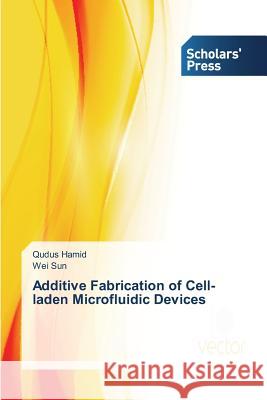Additive Fabrication of Cell-laden Microfluidic Devices » książka
Additive Fabrication of Cell-laden Microfluidic Devices
ISBN-13: 9783639662207 / Angielski / Miękka / 2014 / 184 str.
This book presents advances in additive manufacturing techniques, the utilization of plasma chemistry to enhance surface functionalization, and manipulation of photo-polymerization to investigate new approaches to assemble cell-laden microfluidics. Specifically; studying of SU-8's potential to serve as a bio-compatible material for the development of microfluidic chips with enhanced cell attachment and proliferation. Utilizing a digital mirroring system with a multi-nozzle biologics deposition system to assemble cell-laden microfluidics. Exploring a freeform micro-plasma system for the development of a three-dimensional cell-laden microfluidic chip. Develop and characterize an additive fabrication system which utilizes; a multi-nozzle biologics head, a micro-plasma head, an ultra-violet component, and a photo-polymer material delivery component to fabricate 3D micro-architecture. Develop and characterize a cell-laden microfluidic chip to investigate drug metabolism and deliver chip that produces a microfluidic environment which facilitates co-culture of cancerous cells.
This book presents advances in additive manufacturing techniques, the utilization of plasma chemistry to enhance surface functionalization, and manipulation of photo-polymerization to investigate new approaches to assemble cell-laden microfluidics. Specifically; studying of SU-8s potential to serve as a bio-compatible material for the development of microfluidic chips with enhanced cell attachment and proliferation. Utilizing a digital mirroring system with a multi-nozzle biologics deposition system to assemble cell-laden microfluidics. Exploring a freeform micro-plasma system for the development of a three-dimensional cell-laden microfluidic chip. Develop and characterize an additive fabrication system which utilizes; a multi-nozzle biologics head, a micro-plasma head, an ultra-violet component, and a photo-polymer material delivery component to fabricate 3D micro-architecture. Develop and characterize a cell-laden microfluidic chip to investigate drug metabolism and deliver chip that produces a microfluidic environment which facilitates co-culture of cancerous cells.











